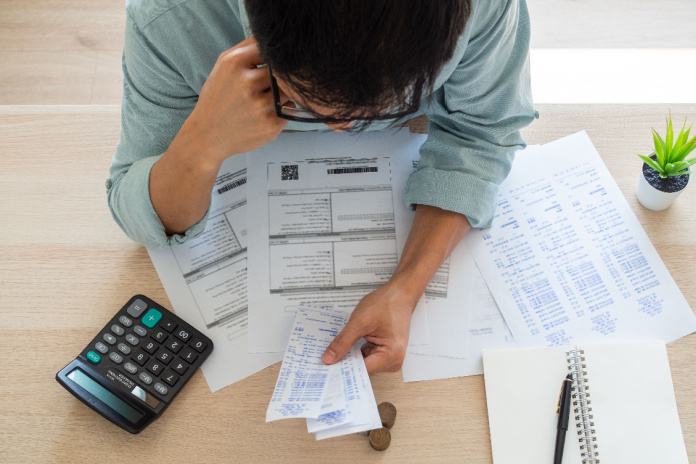Whether it’s a mortgage, credit card debt, or student loans, having a large debt can make it challenging to achieve financial goals and live the life you want. Fortunately, here are tips and strategies you can use to help you pay off your debts and achieve financial freedom:
1) Create a Budget
Start by creating a budget to see how much money you have coming in and going out each month. It will help you identify where to cut back on expenses and put more money toward paying off your debt.
Creating a budget can help you pay off debt in several ways:
a) It enables you to identify areas where you can cut back on expenses
Creating a budget lets you see where your money goes each month. It allows you to identify areas where you may be overspending and can cut back on expenses.
b) It helps you track your progress
When you create a budget, you’ll have a clear idea of how much money you have available to pay off your monthly debt. It allows you to track your progress over time and see how much closer you get to debt-free.
c) It helps you avoid adding to your debt
When you create a budget, you can see how much money you can spend each month. It can help you avoid overspending and adding to your debt.
2) Prioritize Your Debts
List all your debts and prioritize them by interest rate, with the highest interest rate debt at the top. Here are a few ways prioritizing your debts can help:
a) Boosts your motivation
When you focus on paying off one debt at a time, you’ll start to see progress and feel more motivated to continue.
b) Helps you create a plan
When you concentrate on one debt at a time, you can plan how much extra money you’ll put toward that debt each month and when you expect to have it paid off.
c) Reduces your stress
Prioritizing and paying your debts one at a time can reduce your stress and give you control over your finances.
3) Make Extra Payments
You can do this by paying more than the minimum payment each month or making additional monthly payments. Here are a few ways making extra payments can help:
a) Reduces the principal balance
When you make extra payments, the extra money goes towards reducing the principal balance of your debt.
b) Saves you money on interest charges
Your interest over time will be less when you owe less money. You can save finances on interest charges and pay off your debt faster by making extra payments.
c) Improves your credit score
When you make extra payments, your credit utilization ratio (the amount of debt you owe compared to your credit limit) will be lower, which can improve your credit score.
4) Consider balance transfers
If your credit card has high-interest debt, you should transfer the balance to a card with a lower interest rate. Here are a few ways debt consolidation can help:
a) Simplifies your payments
With debt consolidation, you’ll have only one monthly payment instead of multiple payments to different creditors. It can make it easier to manage your finances and ensure you don’t miss any payments.
b) Lowers your interest rates
If you have high-interest credit card debt, consolidating it into a single loan with a lower interest rate can save you money on interest charges.
c) Provides a more precise timeline
When you consolidate your debts, you’ll have a more precise timeline for becoming debt-free.
d) Helps you avoid late fees and penalties
Combining your debts into a single loan with a lower interest rate can lower your monthly payments and make them more manageable.
5) Increase your income
Consider getting a second job or selling things you no longer need to supplement your income. Here are a few ways that increasing your income can help you pay off debts:
a) Provides more money to put towards debt payment
When you have more income, you have more money to put towards debt payments because you can make larger monthly payments.
b) Helps you avoid accruing more debt
When you can cover your expenses with your income, you’re less likely to rely on credit cards or loans to make ends meet.
c) Increases your financial security
When you have a higher income, you’re more financially secure and may be better able to handle unexpected expenses.
d) Boosts your motivation
Your income increase can motivate and help you stay committed to paying off your debts.
6) Lower Your Bills
Lowering your bills can be a great way to free up money in your budget to help you pay off debts faster. Here are a few ways that lowering your bills can help you pay off debts:
a) Provides more money to put towards debt payments
When you reduce your bills, you have more money for debt payments.
b) Helps you avoid accruing more debt
When you can cover your expenses with lower bills, you’re less likely to rely on credit cards or loans to make ends meet.
c) Encourages good financial habits
When you make an effort to lower your bills, it encourages good financial habits. It can help you avoid overspending in the future and make it easier to stay on track with your debt payments.
Base-line
Paying off debt can be challenging, but these strategies make it easier and more manageable. Furthermore, it is a journey that requires patience, discipline, and consistency. By taking control of your debt and implementing these tips and strategies, you can become debt-free and enjoy financial stability and security benefits.
